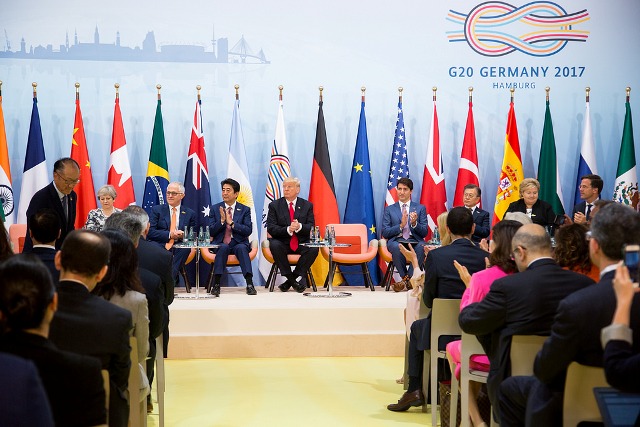 The G20 has limited room for manoeuvre, but informed and challenged by and about these trends, it may yet find a way forward. [Photo: G20 official]
The G20 has limited room for manoeuvre, but informed and challenged by and about these trends, it may yet find a way forward. [Photo: G20 official]
[This is an excerpt from an article in the current issue of The Round Table: The Commonwealth Journal of International Affairs.]
The G20 has to respond to distinctive varieties of capitalism/development/regionalism over the last two decades, now exacerbated by climate change/global warming: what is emerging? Where? Chinese and other definitions are reflected in varieties of capitalism and emerging multinational corporations (EMNCs), with Chinese companies being 100 out of the ‘Global Fortune 500’ top corporations right after the US. Now, each of the BRICS hosts some global brands: Geely, Haier, Huawei, Lenovo and Xiaomi (China); Hyundai, Kia and Samsung (Korea); Embraer and Vale (Brazil); Infosys, Reliance and Tata (India); Lukoil, Gazprom, Severstal and Rusal (Russia); and Anglo American, De Beers and SABMiller (Republic of South Africa), etc.
Emerging Economies/States/Societies and Universities and Think-tanks?
In the new century, the salience of ‘emerging markets’ along with emerging donors/economies/powers/states, especially the BRICs and other political economies in the new ‘second world’, constitutes a central shift in global relations, inter-state and transnational, formal and informal; seen, for example, in burgeoning Chinese tourism throughout the world market, including cruise ships from Shanghai and Singapore. It has led to energetic analytic and applied perspectives and debates about the similarities and differences among emerging economies/middle classes/multinational companies/states/societies, etc. informed by different disciplinary canons.
In turn, especially in orthodox state-centric IR, there are many analyses of emerging powers – regional and otherwise. There are more aspiring regional powers than just the BRICS (e.g. from among the N-11 (Next Eleven), Indonesia, Nigeria, Turkey) and some of the BRICS such as China may seek influence at a higher, global level than just the region.
As the number of states, especially small states, continues to grow in the twenty-first century so the number, range and variety of ‘regions’ proliferate along with inter-regional associations/coalitions. So, for example, all the major powers around the emerging Central Asia have their own definition of their ‘region’, from BRICS such as China (SGO), India and Russia to Iran, Iraq and Turkey. Similarly, there are many definitions of today’s ‘Silk Road’ or BandRI in terms of communities/cultures, communications, ecologies, geographies, hubs and technologies (from air cargo, containers and rail to trucks let alone digital/virtual).
The (re?) emergence or recognition of emerging middle classes in the global south, just as some in the north move down the social ladder, also affects the G20 context. So MNCs/brands/franchises which produce automobiles, clothing, electronics, entertainment, food and media are increasingly concentrating on markets in the rising global south, from Diageo spirits and McCain French fries (over 40 refrigeration plants globally), to supply fast food in the global south, especially Asia (eight plants, mainly in Australasia) as well as the north (seven in Canada, 10 in the US, 10 in the EU and five in the UK), to, for example, Nestlé drinks/sweets, Procter & Gamble personal products, SABMiller beers and Unilever cleaning liquids/powders.
In terms of NTS/human or citizen security, the incidence of disease is also shifting to the global middle class, especially NCDs such as cancers, coronary conditions and diabetes; so manufacturers of drugs like insulin, such as Nova Nordisk, increasingly concentrate on markets in the rising global south; and, according to SABMiller, notwithstanding slow sales in its two home markets of South Africa and the US, Africa is now SAB’s fastest growing market, especially resource producing/exporting economies such as Ghana, Nigeria and Zambia.
In turn, some major centres of analytic and policy development in universities and think-tanks are emerging for the mix of BRICS and regionalisms, including BRICS centres in Delhi or Rio and at the University of Toronto in Canada and GIGA in Hamburg or UNU-CRIS in Bruges, respectively. Symbolic of the recent rise of Turkey, despite or before Erdogan, is www.risingpowersproject.com.
New Regionalisms
The proliferation of states post-bipolarity has led to a parallel proliferation of regions, especially if diversities of non-state and informal even illegal regions are so considered; and the eurozone crisis concentrated in the PIIGS, now compounded by Brexit and the EU’s migration invasion, has eroded the salience of the EU as a model leading to recognition of a variety of ‘new’ regionalisms.
These include instances of ‘African agency’ such as: (a) South African franchises and supply chains reaching to West Africa; (b) the Trilateral Free Trade Association (FTA) among the Common Market for Eastern and Southern Africa (COMESA), East African Community (EAC) and South African Development Community (Tripartite Development Community) (SADC (T-FTA)) and now Continental Free Trade Area (CFTA) along with (c) older/newer regional conflicts such as the Great Lakes Region (GLR).
Timothy M. Shaw McCormack is with the Graduate School, University of Massachusetts, Boston. The next G20 Summit takes place in Buenos Aires from 31 November–2 December.



